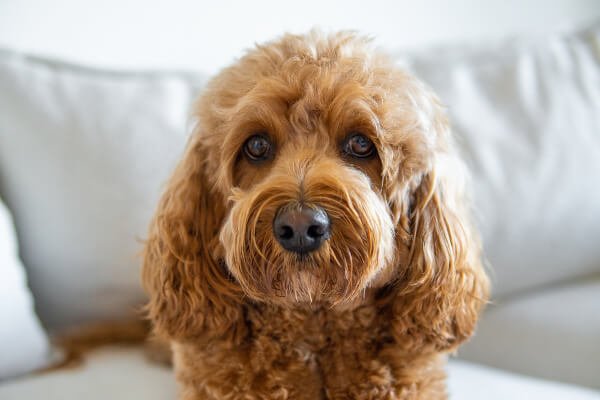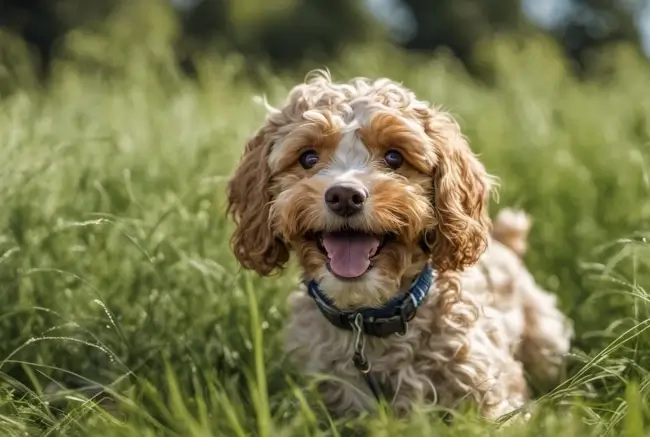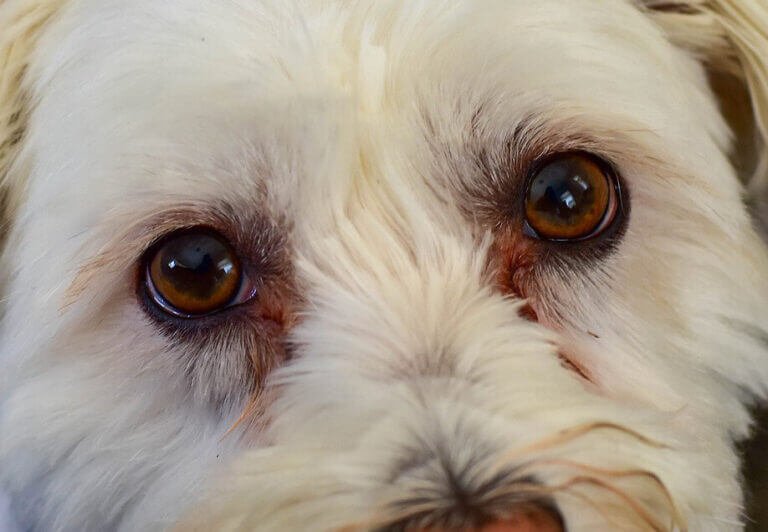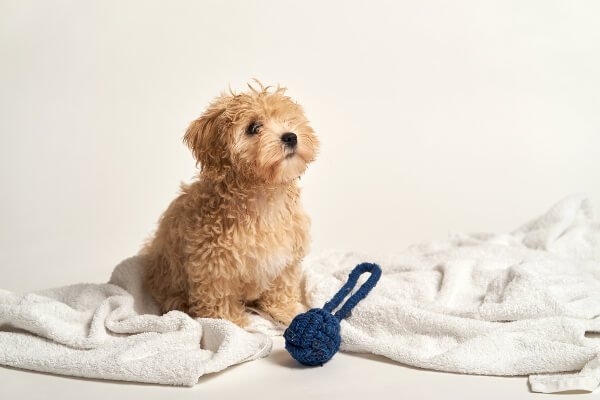Why Does My Cavapoo Sneeze? (9 Reasons Explained)
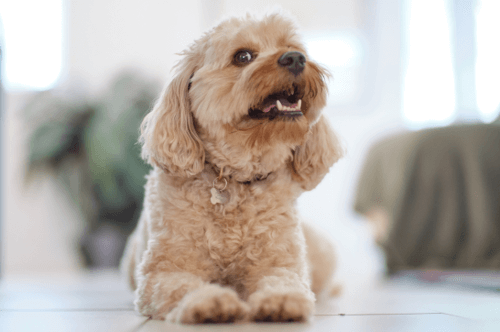
Your dog sneezing occasionally is not cause for concern, but maybe you have noticed them sneezing more frequently or at unusual times.
It is a good idea to rule out potential irritants and see what you can do to help if something is bugging that sensitive snout!
But exactly why does your Cavapoo sneeze?
Read on to find out why!
Should You Be Worried If Your Cavapoo Sneezes?
The simple answer to that is, it depends.
The occasional sneeze is not something to worry about and is a normal part of the nose’s function.
It is an effective way of removing irritants from the nasal passage.
But if your dog is sneezing frequently (multiple times per day or in frequent bursts), you should look into what is causing that.
9 Main Causes That Will Make Your Cavapoo Sneeze:
1) Foreign Object
When our dogs are exploring, they are often led by their nose.
This can end up in foreign objects being accidentally inhaled and then stuck in their nasal passages.
If your dog has a foreign object stuck in his nose, his body’s response will be to try and remove it by sneezing.
When the object doesn’t come out after the first sneeze, your dog will start to excessively sneeze in an attempt to dislodge it.
Another symptom that distinguishes a stuck foreign object from something like allergies would be your dog pawing at its nose.
2) Allergies
Just like humans, dogs can suffer from seasonal allergies.
This is a common cause of sneezing when pollen counts are high.
Keep an eye out for when your dog is sneezing, maybe it is after they have been outside or when you’ve left a window open.
If that is the case, there is a good chance that seasonal allergies are to blame.
This can be sorted out with allergy medication or even steroids for more serious cases.
3) Playing
You may have noticed that your dog sneezes when they are playing or feeling excited.
This is called ‘play sneezing’ and it is normal.
It means your dog is having fun.
It’s their way of showing that they are only playing, not showing aggression or a challenge.
Play sneezing can be more common in smaller breeds but larger breeds can also exhibit this behavior.
On the converse, just because your dog isn’t sneezing while they are playing does not mean they aren’t having fun!

4) Nasal Mites
Nasal mites are fairly common in dogs and many infected dogs don’t show any of the usual symptoms.
Those include nasal discharge, nose bleeds, sneezing, and reverse sneezing (if you are unfamiliar with the term, it is explained below).
Veterinarians will examine your dog’s nose with an endoscope and perform a nasal flush to diagnose whether they are suffering from nasal mites.
If these critters are deemed to be causing your dog some worry, your dog will likely be prescribed an anti-parasitic medication.
5) Infected Tooth
An infected tooth (particularly the third upper premolar due to its proximity to the nasal passage) may cause sneezing.
Yearly dental checks will keep you ahead of this and keep an eye out for unexplained drooling, reduced appetite, and foul breath, which could indicate dental issues.
If your Cavapoo is experiencing problems in their mouth, it will greatly affect their day-to-day life.
Make sure to book a visit with your veterinarian as soon as possible if you suspect your dog is suffering from a problem tooth or dental disease.
6) Stress
Just as it can be a sign of playing, sneezing can also be a sign of stress in Cavapoos.
As with yawning and panting, sneezing is the body’s way of releasing pent-up stress.
This may happen in times when loud noises are present (like fireworks or sirens), trips to the vet, or when your nervous dog is in a new place.
If you want to know whether your dog’s sneezing is a sign of stress, look at their general demeanor.
Is their tail tucked between their legs?
Maybe they are refusing to eat the treats you have offered.
Or in severe cases, your dog may be trembling all over.
These are definite signs that something is causing your dog concern.
Think about what is different in their surroundings or routine and if you can’t find anything out of place, a vet visit may be a good idea to get some answers.
7) Tumors
Tumors causing persistent sneezing in dogs are rare but they can happen.
One of the most common causes of tumors in the nasal passages is the inhalation of secondhand smoke.
It is also more common in dog breeds with longer noses.
Most dogs suffering from nasal tumors will have some sort of discharge from either one or both nostrils that is pus-like or has a bloody appearance.
Other symptoms include noisy breathing (due to the obstructed airflow), weight loss, lethargy, and coughing.
To diagnose nasal tumors, your veterinarian will use imaging to see inside the nasal area.
If a tumor is discovered and found to be cancerous, your veterinarian will be able to discuss the best route forward for you and your pooch.

8) Perfumes
Dogs have sensitive noses.
Their noses can be up to 10,000 times stronger than our human noses.
Strong scents that are made for us to be able to smell can easily irritate your Cavapoo’s sensitive nasal passages which will result in sneezing.
Smelling other things like scented candles, air fresheners, or smoke, can also cause your dog to sneeze.
9) Dog Flu
Dog flu, or canine influenza virus, is an infectious disease that affects the respiratory system.
The virus is airborne and while a sick dog coughs or sneezes, the virus can then be inhaled by another previously uninfected dog.
Direct contact with an infected dog or with contaminated objects can also spread the virus.
Symptoms include coughing, sneezing, lethargy, difficulty breathing, nasal discharge, and runny eyes.
Areas like kennels and dog parks are breeding grounds for infectious diseases like canine influenza.
The disease does not have a cure, but there is a supportive treatment to keep your Cavapoo comfortable while they recover.
Why Are Cavapoos Prone To Sneezing?
Certain dog breeds are more prone to sneezing due to their shorter noses.
Dogs with excessively short noses, called brachycephalic breeds, like Pugs, French Bulldogs, and Cavalier King Charles Spaniels, are particularly prone to this.
Since Cavapoos are half King Charles Spaniel, they can also share these issues.
Another common affliction brachycephalic breeds battle with is reverse sneezing which, again, can occur in Cavapoos too.
If you aren’t familiar with the term, have a look at the description below.
Will A Cavapoo Puppy Grow Out Of Excessive Sneezing?
If you have recently had or been around a puppy, you may have noticed that the pup sneezes a lot more than adult dogs.
There is a simple reason for this.
Puppies are still developing their immune system so when they are sniffing around, their nose can react more strongly to allergens.
As your Cavapoo puppy gets older, the sneezing should reduce significantly.
If it has not, you may have a dog that needs to be on allergy medication which is manageable for most dog parents.
What Is Reverse Sneezing?
When a dog sneezes, the air is rapidly pushed out of their nose.
Reverse sneezing is the opposite of that, where your dog rapidly pulls air into their nose.
It can be alarming to look at but your dog is not suffering any harm.
If you are confused as to what a reverse sneeze looks like, the dog will stand still and make rapid inhalations through their nose while extending their head and neck.
A loud snorting noise is made while this happens.
These episodes can last from either a few seconds to a minute.
Try to calm your Cavapoo by stroking their throat lightly and, if possible, gently push one nostril closed.
This should kick them back into breathing normally.
When Does Sneezing Warrant A Vet Visit?
As previously mentioned, the occasional sneeze is normal.
Excessive sneezing is not.
If your dog is consistently having episodes of excessive sneezing or exhibiting symptoms such as unusual discharge or pawing at their nose, it is advisable to take your dog to the Vet for a checkup.
They will be able to give you an accurate diagnosis and get your Cavapoo back on track.

